2022 Graduate Profiles
THE 98TH ANNUAL CONVOCATION OF ST. STEPHEN'S COLLEGE
DOCTOR OF MINISTRY
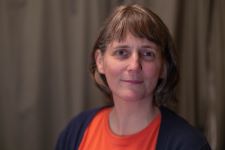 Colleen Deatherage
Colleen Deatherage
Colleen Sheehan Deatherage, MSW RSW, DMin resides on unceded Ktunaxa Territory (aka the BC Kootenays). Her social work practice and a desire to learn more about the experience of spiritual practitioners living with chronic illness brought her to St. Stephen's. This led to training as a folklorist and ethnologist during her doctoral programme. Her current research and teaching interests combine these disciplines and includes unconventional spiritualities, informal communities, cræft, the tradwife movement, social work practice, and critical reflection. A self-described research nerd, she has a particular interest in creative methodologies and digital ethnography. Colleen currently divides her time between her academic pursuits and her social work practice. Her social work practice has included a range of experiences from medical social work and emergency psychiatry to family services, clinical supervision, and providing therapy.
Dissertation Title: A Field Guide to Sanctuary: Women’s Experiences of Personal Sanctuary Contextualised Within Chronic Health Conditions
Dissertation Abstract: This analytic autoethnography draws on a passage from Celtic philosopher John O’Donohue to consider women’s experience of personal sanctuary within the context of chronic health conditions. Guided by the question: ‘what is your experience of sanctuary and how does that relate to your experience of your chronic health condition’ and informed heavily by social work theory and practice, this dissertation engages a range of research methodologies and methods, including Critical Reflection on Practice and Response Art (from art therapy) in conjunction with participant interviews. Through the constant comparative method, the data revealed that within this context, sanctuary comprises elements (spirituality, nature, creativity, and purposeful occupation), as well as qualities (transgressiveness, nourishingness, and fluidity). This research not only revealed the structure of sanctuary, it assisted the author to understand sanctuary as her personal ministry and fundamental to her social work practice, as well as clarifying the spiritual practices leading to her experience of sanctuary. This dissertation concludes with many plans for future study, including the possibility of this type of sanctuary as a social work practice framework.
Favourite SSC memory: Impossible. I was so fortunate to have three years with the most fascinating group of folx where I was challenged to learn and grow the whole way along. I will always be grateful for Henriette's encouragement to explore and take risks.
Future ambitions: Continue my research!
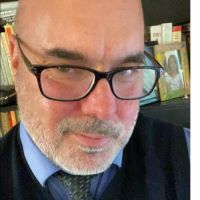 Kevin Powell
Kevin Powell
Kevin Powell is a Lutheran pastor serving in Calgary. He also serves as president of the Alberta Pastoral Care Association. His research centred on the spirituality of money as it pertains to revenue generation in faith communities. His dissertation was a self-study on the concept of the “money wound.”
Dissertation Title: Tending the Money Wound: A Performative Autoethnography of Testimony
Dissertation Abstract: As churches and other ministries struggle with financial shortfalls due to COVID-19 and other socio-religious reasons, many church leaders are anxious about becoming under-resourced. Funding is quickly becoming an urgent challenge, and many churches and ministries are either restructuring to soften the crisis or closing altogether. To explore this challenge from a personal and professional lens, I wrote and preached a sermon series using first-person testimonial preaching through the performative utoethnography method. In the series I explored the concept of the “money wound” as it pertains to revenue generation among church leaders, particularly within my own narrative. Data was collected through the sermon series. Reflections on the sermon series expanded the narrative of the series while also self-consciously examining the quality of the sermon, discussing whether the stories in the series met their intent. Implications for further research and practice are for first-person narrative preaching and sermons about money, as well as stewardship conversation and planning, ecclesial structural renewal, and further reflection on the spirituality of money.
Favourite SSC Memory: My favourite St. Stephen’s memory was during the intensive weeks was learning from colleagues from a variety of traditions, providing insights that I hadn’t previously considered. Another memory is meeting former prime minister Kim Campbell at the student centre while having lunch.
Future Ambitions: Future aspirations are to continue serving the church in parish ministry and create a consultancy where people share their money stories to begin healing from a toxic money narrative.
Master of Theological Studies
 Ibrahim Cin
Ibrahim Cin
Originally from Türkiye, Ibrahim Cin, lives in Edmonton where his work has focused on improving interfaith dialogue between Muslims and other faith and secular communities in Canada. Ibrahim has served in Edmonton as a community leader, teacher, peacemaker, advisor, spokesperson and activist in many areas, especially as an advocate for multiculturalism, social justice and interfaith relations in Canadian society. From 2009-2017 Ibrahim served as the Executive Director of the Edmonton chapter of the Intercultural Dialogue Institute. Throughout his time in Edmonton, Ibrahim has been involved with and organized a number of interfaith activities locally, provincially, nationally and internationally, including: talks, film events, seminars on intercultural and interreligious themes, and an annual Friendship Dinner with the participation of hundreds of people from different faiths, cultures and ethnicities. For his service to the community, Ibrahim was awarded the Queen’s Diamond Jubilee Medal by the Governor General in 2012. Ibrahim recently finished a Masters in Theological Studies as part of his Chaplaincy training for the Royal Canadian Armed Forces. As an extension of his many years of work and experience in multicultural and interfaith work, Ibrahim’s area of research focused on Muslim Chaplaincy and implementation of the profession in multifaith settings here in Canada.
Culminating Paper Title: Forming my Identity in Professional Chaplaincy
Culminating Paper Abstract: In this culminating paper, I reflect upon my spiritual care practice and share personal reflections on how I believe my experience, faith, and education will help me serve as a Muslim chaplain in the Canadian Armed Forces. Through the Master of Theological Studies program, I have recognized that unity and community are two values that strongly motivate my spiritual life and professional interests. In this context, I discuss my role as a military chaplain and how my learnings have contributed to my understanding and growth in order to become a more effective Muslim chaplain. Through many years of community chaplaincy work, I have gained a great deal of experience and skills in active listening, counselling, and non-judgmental positive regard, to name a few. This paper further reflects upon Islamic sacred texts that are influential and exemplary lives of Muslim scholars, that are motivational for my chaplaincy service. Moreover, this paper also reflects on how my studies have provided me with the required self-confidence and professionalism to become a better spiritual care provider. To address the connection between chaplaincy and Islam, I describe the formation of Muslim chaplaincy within the traditions of Muslims, the development of the profession, and the application of the profession within multifaith and secular workplaces. In doing so, I explore three central questions critical to my learning: (1) What moves me to provide spiritual care?, (2) What is the connection between chaplaincy and Islam, and how does this connection help me to provide spiritual care?, (3) As an Islamic faith leader, can I genuinely serve within a multifaith workplace?
Future Ambitions: As a natural evolution of his career, he will continue helping people and connecting communities within the Canadian Armed Forces.
 Gabrielle Gelderman
Gabrielle Gelderman
Gabrielle Gelderman is a third-generation settler born and raised in amiskwaciwâskahikan, Edmonton Alberta. After spending part of her early adulthood working on Treaty 6 territory as a climate justice organizer and environmental educator, Gabrielle saw a need for bringing spirituality into the climate realm, in particular as a way to address the high rates of climate grief and anxiety. She decided to become a chaplain and while at St. Stephen’s, conducted her thesis research on the healing of climate grief in young climate organizers. Her work focused on using story-telling, free writing and group sharing as opportunities for communion and transformation. She now works both as a hospital chaplain and a social movement chaplain, the latter of which involves supporting young climate organizers and other people in social movements to bring practices of connection and healing into their work. The most recent and unexpected application of her theology degree has been in creating weird, irreverent memes on healing and spirituality which you can see on Instagram via her account, @theclimatechaplain.
Thesis Title: To Be Alive in the World Right Now: Climate Grief in Young Climate Organizers
Thesis Abstract: The following study addresses the experience of climate grief in young organizers in Edmonton, Alberta / amiswaciwâskahikan, Treaty 6. Grounded in an art-based research methodology and using a theological lens, I examined the ways climate organizers give meaning to their grief and the ways shared forms of meaning-making can lead to healing. Informed by a narrative métissage model, I designed two workshops in which nine participants developed both personal and shared narratives about their grief. An analysis of the personal narratives revealed six emotional themes used to describe and make sense of grief: anger/bitterness, fear/anxiety, guilt/self-criticism, hopelessness/despair, resolve/determination, and sorrow/hurt. Additionally, an investigation into the group process showed that by sharing their narratives, participants were able to experience a meaningful and healing connection to themselves, one another, and/or something beyond the group. It was the experience of connecting to an entity or narrative which transcended the group that provided the most enduring form of meaning, helping participants feel more able to face the pain of future loss. A discussion of these findings concluded that having access to shared spaces of mourning and meaning-making is critical for climate organizers’ healing. It was shown that without these spaces, participants were forced to cope with their grief individually, often using strategies like numbing, avoidance, and blame, all of which caused feelings of disconnection and distress.
Favourite SSC Memory: Gabrielle’s favourite memory at St. Stephen’s is of her time in her CPE (Clinical Pastoral Education) cohort groups.
Future Ambitions: Her ambitions for the future include completing her CPE training and eventually transitioning to doing climate grief chaplaincy full-time.
Master of Psychotherapy and Spirituality
 Oksana Atwood
Oksana Atwood
Oksana has worked in community mental health for several years and uses an interdisciplinary and creative approach. She is the Director of Religious Exploration for the Unitarian Church of Edmonton. She also holds positions as a Mental Health First Aid facilitator and a Community Engagement Facilitator. Integrating nature, cycles and seasons is in an integral part of spirituality. Sitting amongst the decades year old trees on campus helped to ground her spiritual journey through the seasons at St. Stephen's College.
Capstone Title: Postcards from the Pandemic: A Life Review Tool to Explore COVID-19 Experiences
Capstone Abstract: Statistics on depression, anxiety, and substance use indicate increased mental health problems during the COVID-19 pandemic (“Mental health and substance use,” 2021). The pandemic has also created a cognitive distortion of time and memory, possibly indicating prolonged trauma (Holman, 2020). Current life review techniques are limited in their ability to explore this unprecedented and ongoing pandemic time. Maps can be used as a source of information and as a reference for direction. Clients can use mapping as a life review technique with their therapists to help them understand their experiences during the coronavirus pandemic. Method: Three areas of the research landscape were explored: life review techniques that employ maps, how mapping is used as a psychotherapeutic tool, and how people process their journey through the pandemic. Because postcards are traditionally associated with pinpointing stops on a journey, a series of postcards with mapping activities were designed for clients and therapists to use as a psychotherapeutic tool to help process the coronavirus pandemic. Project: The set of eight postcards is aligned with physical, emotional, social, intellectual, environmental, spiritual, occupational, and financial aspects as a holistic approach to mental health. The postcards were designed for clients and therapists to use together in therapeutic sessions to remember, reflect, and reframe COVID-19 experiences. Conclusions: Having visual life review tools, such as maps, can help clients recall times that may be blocked, overlooked, or blurred. Looking back on the journey is an integral part of healing, building resilience, and moving forward. Finally, spiritual reflection is exemplified in a personal integration that looks back at my journey through the Master of Psychotherapy and Spirituality (MPS) program at St. Stephen’s College during the COVID-19 pandemic.
 Bo Cao
Bo Cao
Before immigrating to Canada, Bo Cao lived in China and worked in the field of engineering. Inspired by the transformative power of psychotherapy, Bo decided to join the MPS program at St. Stephen’s College. Upon seeing the need for support for Chinese immigrant parents in the community, Bo designed a parenting workshop with the purpose of equipping Chinese immigrant parents with the skills to foster “qin (親)”— a traditional Chinese concept of closeness in parent-child relationships — with their children as her Capstone project. Bo is now graduating with a Master’s degree in Psychotherapy and Spirituality.
Capstone Title: Fostering Qin (親) in Parent-Child Relationships: Creating a Parenting Workshop for Parents in the Chinese Community
Capstone Abstract: A review of the literature shows that acculturation-based conflicts caused by parent-child acculturation discrepancy play an important role in Chinese immigrant families and are significantly related to maladjustment and mental health issues among Chinese immigrant children. Studies of Chinese parental ethnotheories reveal that the solution may lie in the strengths of Chinese parenting: benevolent parenting and the parent-child qin (親) relationship, a traditional Chinese concept that holds similarity to the Western notion of secure attachment in terms of outcomes, parent-child relationships, and parenting practices. A parenting workshop has been designed to empower Chinese immigrant parents with knowledge and skills to foster a qin (親) relationship with their children. The well-researched attachment theory will be used for elucidating the evolution of the parent-child qin (親) relationships during different life stages. Being encouraged intentionally adopt a cultural socialization approach to develop shared cultural understanding with their children, Chinese immigrant parents are introduced to skills from the Circle of Security – a parenting approach based on attachment theory – to foster the parent-child qin (親) relationship. Personal reflections on my learning journey are also provided in an integrative paper, in which I reflect on my personal learning journey, my spiritual approach, and my professional identity.
Favourite SSC Memory: In Group Counselling with Jenny McAlister, we took turns to be group leaders and members for experiential learning. I felt a deep connection with the class and the SSC community through that experience.
Future Ambitions: To continually grow as a person and expand my capacity to be helpful.
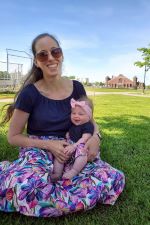 Rebecca Foley
Rebecca Foley
Rebecca Foley is an Anglican Priest currently serving as a chaplain in the Canadian Armed Forces. She explored how couples' different attachment orientation impacts their relational satisfaction when deployed and separated within the military context. She serves alongside her husband at CFB Edmonton and presently is on Parental leave, enjoying spending time with their newest little recruit, Charlotte.
Capstone Title: Understanding How Attachment Orientation affects Military Couples during Deployment: A Workshop to aid in Communication and Relationship Satisfaction
Capstone Abstract: Deployment is one of the most stressful periods in one's military career, yet also the most highly anticipated. Substantial money is spent ensuring the military member is prepared and qualified for the task at hand, yet little is done to prepare them or their families for the emotional trauma and challenges which it brings. Failure in communication and understanding the realities of deployment causes frustration and marital dissatisfaction, often resulting in separation and divorce. Presently there are no workshops dedicated to military members who are preparing to deploy to assist with this. Distraction away from the mission is not only dangerous, but also costs the military substantial resources, when the affected member becomes a casualty needing immediate care in times of divorce. A workshop dedicated at examining relational communication, how we respond under periods of stress and trauma, as well as explaining the intricacies of deployment will help couples to not only understand each other better, but to strengthen their bonds, and help protect their relationship from failure. This is done through a proposed workshop examining how one's attachment orientation alters how one perceives and responds to threats and stress, and the steps a partner can take to better prepare and provide support. Personal reflections on my learning journey are also provided in a final integrative paper, in which I reflect on my spiritual approach, professional identity, and personal learning journey.
Future Ambitions: Upon graduation from St. Stephen’s, Rebecca will work as a mental health chaplain in the psycho-social unit at CFB Edmonton, supporting military members in processing their traumas.
 Elizabeth (Libby) Kostromin
Elizabeth (Libby) Kostromin
Thesis Title: Love Beyond Death: Suicide, Acceptance and the Awakening of the Bereaved
Thesis Abstract: In the West today suicide is considered a major public health issue of tragic consequence; universally devastating to those it bereaves. This enquiry explored an unusual experience of bereavement by suicide for the purpose of challenging common cultural beliefs, including that: suicide is violent, irrational, tragic, selfish, unexpected and always the result of mental illness, and; that those bereaved by suicide are inevitably guilt-laden, devastated, angry and ashamed. The research methodology was autoethnography within the context of a spiritual research paradigm. Analysis and interpretation drew upon three complementary approached/orientations: Buber’s philosophy of dialogue, critical theory and hermeneutic interpretive phenomenology. Findings consist of narrative compositions which illustrate how a lived spiritual orientation can not only ameliorate the effects of suicide bereavement and insulate survivors from social stigma but may also trigger an awakening of the bereaved. This lived spirituality included: a cosmic perspective; and openness of heart and mind; the recognition and valuing of relationship and connection; a stance of humility with respect to one’s capacity to influence another’s intentions; an acceptance of the ‘unacceptable’; the willingness to fully face the prospect of a loved one’s intentional death, and; enduring attempts to ‘be’ unconditional love. This research creates space in which freedom from oppressive social forces can be conceived and invites psychotherapy practitioners into deeper relating in support of spiritual maturation.
 Britnie MacLean
Britnie MacLean
Britnie MacLean lives within Treaty 6 territory in Drayton Valley, Alberta, a small rural town nestled near the North Saskatchewan River. She has focused her academic and applied work within the realms of gender equality, transformative experiences after trauma, and the use of stories to create spaces for healing. She hopes to use her academic experiences at St. Stephen’s, applied work in practicums, and capstone project to help promote healing and hope to her clients in the future.
Capstone Title: Holding Space for Healing: Group Therapy Manual for Clients who have Experienced Intimate Partner Violence
Capstone Abstract: Intimate Partner Violence (IPV) is a pervasive public health issue that disproportionately effects women. The consequences of IPV can be seen in the long-lasting effects it has on economic, legal, and healthcare systems. Additionally, IPV poses a variety of individual and interpersonal issues that are noted as being long lasting and treatment resistant. Within the past 50 years there has been an increase in understanding this issue, creating policy and legal practices to protect women, and concentrated efforts to ensure victims of IPV have the ability and resources to leave an abusive relationship (Heywood & Mulveen, 2021; Heywood, Sammut, & Bradbury-Jones, 2019). While there is considerable understanding of the change processes, supports, and psychological elements required for leaving abusive relationships, there is a significant lack of understanding as to how women heal and incorporate change after sustained separation from an abusive partner (Campbell & Soeken, 1999; Wozniak & Allen, 2012). Due to this gap in literature and professional interventions, my capstone project was to create a group therapy manual to provide a therapeutic tool that promotes healing after an abusive partnership. The manual has a primary focus on the participants understanding of self, how to move through the stages of Thrivership, and increase personal confidence. This will be done by encouraging a holistic exploration of self and viewing the healing process as continual rather than outcome based. To conclude this project personal reflections relating to my learning experience, spiritual approach, and professional identity are included.
Favourite SSC Memory: There are many memories I have from my time at St. Stephen’s. However, that lunchroom table in the lounge is a place that has gathered many of my favourite memories from my time in the program. From nervously sitting and chatting with others during the interview process, to the laughs and deep conversations had with fellow students during the weeklong intensive courses.
Future Ambitions: My ultimate professional goal is to open a private practice. From working within a small private practice during practicum I thoroughly enjoyed the challenges and benefits that come from this line of work. Before this though, I hope to seek additional training and supervision to help specialize within the areas of psychodynamic theory, intimate partner violence, and trauma work. I also hope to find space (and courage) to bring my capstone manual into practice, to help support those who have left intimate partner violence and promote long-term healing and creation of self.
 Theresa Robinson
Theresa Robinson
Theresa Robinson, BACYC, MDIV, MPS lives in Beaumont Alberta with her five children and husband. She is a Catholic Chaplain at the University of Alberta and is a Counsellor in private practice and also with Catholic Social Services.
Capstone Title: Fostering a Therapeutic Experience of Awe
Capstone Abstract: Awe is a recent area of study that has opened up in the last twenty years. An apparent intersection between psychotherapy and spirituality within this field is present. Furthermore, because research in this area is so new, there are many areas that can be developed further. This capstone will synthesize the present research on awe into the following five categories: 1) benefits (i.e. gratitude, well-being, altruism) 2) spiritual implications (i.e. small-self state, connection and transcendence), 3) components of awe (i.e. vastness and need for accommodation), 4) fostering awe (i.e. present moment awareness or mindfulness, openness, connection), and 5) implications for practice. Using the findings of the literature, a therapeutic tool is presented that hopes to foster therapeutic experiences of awe using present-moment awareness, mindfulness, connection and openness. Finally, personal reflections of my learning journey are provided in an integrative paper, in which I reflect on my spiritual approach, professional identity, and personal learning journey.
Master of Psychotherapy and Spirituality (Art Therapy Specialization)
 Kaeli Feehan
Kaeli Feehan
Kaeli Feehan is graduating from the Master of Psychotherapy and Spirituality (Art Therapy Specialization) program. Her area of study focussed primarily on the importance of assent when engaging with child psychotherapy clients. She has a passion for working with children and intends to focus her efforts on supporting young people through grief and loss.
Capstone Title: Seeking Assent from Children: Using a Picture Book as a Psycho-Educational Tool in Art Therapy
Capstone Abstract: Art therapy is a growing field of psychotherapy and counselling that flows from the understanding that the creative process of art making facilitates healing and personal growth. Children benefit from the creative therapeutic interventions of art therapy as they are instinctively open to art making and creative endeavours. When a child is to receive therapeutic services, informed consent is sought from parents or guardians on behalf of the child. There is a growing body of literature suggesting that seeking a child’s assent in tandem with parent/ guardian consent is an ethical responsibility that garners positive results in research and clinical settings, especially when assent information is disseminated in developmentally appropriate ways. While the topic of assent is regularly addressed in social and medical research with child participants, literature pertaining to assent in psychotherapy, and more specifically art therapy, is lacking. To begin to address this gap in literature I have created a psycho-educational picture book entitled What is Art Therapy?, for early elementary aged children. The purpose of this book is to offer art therapists a tool to not only help educate children on the operations and expectations of the therapeutic process, but also to underscore the importance of offering adequate and comprehensible written information about the art therapy process as part of a larger assent conversation. Personal reflections on my learning journey are also provided in an integrative paper, in which I reflect on my spiritual approach, professional identity, and personal learning journey.
 Stephanie Godel
Stephanie Godel
Thesis Title: Toward an Illustrated Understanding of Art Therapy for ADHD: A Creative Inquiry Using Scoping Review, Autoethnography, and Visual Methods
Thesis Abstract: Affecting at least 5% of youth and 2.5% of adults worldwide, ADHD is associated with considerable suffering. Art therapists must therefore know how best to support clients of all ages who live with this neurodevelopmental disorder. Unfortunately, literature describing or assessing art therapy for this population is spares and typically produced by scholars who do not have ADHD themselves. This qualitative inquiry therefore addressed the question: How does an illustrated description of research about art therapy for ADHA, incorporating the researcher’s firsthand experience of the disorder, illuminate possibilities and guide future inquiry in this area? To this end, I combined scoping review, autoethnography, and visual methods in an arts-based bricolage inspired by and aspiring toward research-creation. I sought English-language articles, books, chapters, and student works released between 1990 and 2020 which explicitly describe art therapy for people with ADHD. Descriptive numerical analysis shows that the collected sources are characterized by limited access, recency, and continuity, as well as citation distortions. Creative qualitative analysis using mixed-media visual methods including altered books and collage identified three clinical consensus themes: framework for freedom, practicing success, and accounting for symptoms. Other key themes \relate to research quality and assessments. This thesis tells the story of its own creation, punctuated and interrupted by autoethnographic texts and images reflecting my struggle through a degree which I am less likely to complete than are my typically developing peers. The work offers an evocative personal narrative, a multi-modal illustration of the existing literature, and recommendations for future study.
 Remy Moerkerk
Remy Moerkerk
Remy Moerkerk is passionate about art and wellness. She currently lives in Edmonton and is about to embark upon her professional life. Academically, Remy's focus was on the study of aesthetics and her population of interest was adolescents and young adults.
Thesis Title: The Function of Aesthetics in Art Therapy: How Art Therapists Perceive the Role of Aesthetics in Art Therapy with Adolescents and Young Adults
Thesis Abstract: This research was fuelled by observations of aesthetic subscriptions in adolescents and young adults. Combining a curiosity with this phenomenon with graduate studies, an intrigue developed considering the nuanced differences between how each of these sectors define, utilize, and approach aesthetics within their respective applications. Using Interpretative Phenomenological Analysis, the assistnace of three co-researchers was enlisted, who are practicing art therapists or art therapy practicum students, to discover how the topic of aesthetics with adolescents and young adults is understood and the role in which aesthetics is observed to have in meaning-making, spirituality, and identity formation. Through semi-structured interviews conducted with the co-researchers, data was obtained that indicated three predominant themes of Belonging, Image, and Hopelessness as relevant to aesthetic subscription in the perceptions of art therapists. Sub-themes were also identified relating to purpose, spirituality, expression, reccreation, the internet, and worries for the future. Aesthetics was viewed by each co-researcher in a different light following the interviews, and an increased understanding into the motivations, drives, characteristics, and identities of their adolescent and young adult clients resulted from their participation. In the analysis of the data, it was determined that an understanding of the aesthetics of adolescents and young adults has become increasingly important in the provision of art therapy as it is an extension of whole-person care relating to the spokes of spirituality, as well as social, cognitive, physical, and emotional needs. The research suggests that this gowing phenomena of claimed aesthetic identities will meld the perceptions of process and product within art therapy theoretical foundations, and that in order to provide adequate therapeutic care to adolescents and young adults increased understanding and awareness is essential.
Favourite SSC Memory: Remy's favourite memory from St. Stephen's College was actually during her undergrad, but it inspired her to pursue a master's degree with the College. She took the Introduction to Music therapy class, and the professor had the class singing "Go Now in Peace" in rounds while walking around the room. This experience was so profound and memorable that it started her on her graduate education journey.
Future Ambitions: Remy's future ambitions are to establish an art therapy practice and take her career to new destinations. She hopes to continue working with adolescents and young adults, and to continue learning and growing in her professional life.

Jillian Paschen
Jillian grew up in Edmonton, where she and her partner, Marlin, still live. Their two adult daughters live in Vancouver and Whitehorse. Jillian believes all humans are creative and that we thrive when we make art together. She is also working with a registered psychologist, seeing Child and Family Services clients, and gradually establishing a private practice. Check out her website at https://ebbandflowarttherapy.ca
Capstone Title: Art Hives: Enhancing Community Resilience, Social Justice, and Spiritual Wellbeing through Creative Process Experiences
Capstone Abstract: During my studies to become a psychotherapist and art therapist, I have been energized and motivated by the potential of group art making to transform individuals, families and communities. The idea that making art in community might bring about individual and social transformation intrigues me. I want to believe it is possible for groups of humans to improve our spiritual wellbeing and community resilience through creative process activities. I also wonder about “community” itself: Can diverse groups of people build a sense of community by gathering together to make art? I have been drawn to explore the mechanism/s by which practicing art therapists believe these changes are possible. As a corollary to this, I explore my Summer 2021 experience of running six pop-up art hives in two ethnically diverse Edmonton communities. I consider whether we were actually able to “build community” or enhance community resilience. As an aspiring art therapist, I have witnessed master art therapists at work and even benefitted from their skill through art studio-inspired epiphanies. I have also begun honing my own skills so that I will be better able to offer art making and creative process settings in which participants can discover and follow their own course of healing. I have seen that when art making can act as a tool for individual and social change and foster increased social and environmental justice, communities benefit in multiple ways (Welsch, 1985; Vick & Sexton-Radick, 2008). Thus, the potential for the third space of participatory action research/art hives to intersect with the liminal, relational, and spiritually healing space that I have experienced in pedagogical art therapy sessions and at art hive events has become a site of curiosity and inquiry for me. This literature review represents and comprises my current attempt to compare and contrast the two separate but related entities of art hives and critical art therapy, as they exist for me—in reality and in potential—in this time and place. I also attempt to illuminate what I perceive to be the epistemological bridges that link art hives and critical art therapy with spiritual wellness, social justice, and individual and community resilience (Van Katwyk & Seko, 2019; Aranda et al., 2012). I look at several aspects of a social justice-related paradigm shift that some art therapists describe as being necessary for our profession. My accompanying project is a manual which sets out a simple recipe for running pop-up art hives with ease. Inherent in both of these projects are the questions I want to explore about the nature of art making and creative process, and how it is that they are connected to our spirituality and potential for healing and transformation, as humans on this planet.
Favourite SSC Memory: One of her happiest memories from her time at St. Stephen’s was discovering community open art studios (better known as art hives). She now helps run an art hive at the Art Galley of Alberta every Thursday at noon.
 Crystal Stretch
Crystal Stretch
Crystal Stretch is graduating with a masters of psychotherapy and spirituality with an art therapy specialization. Her area of focus is in Grief, Loss, and Trauma. She loves working with people of all ages and is excited to enter into this next stage of her professional journey.
Capstone Title: Altering Grief and Death Using Altered Books to Explore Countertransference: A Guide for Counselling Therapists
Capstone Abstract: The experience of death, loss and grief is a major life event that can dramatically alter one‘s life, increasing stress and emotional upheaval. Despite professional training, counselling therapists are not exempt from these stresses. Thoughts, feelings, and attitudes regarding death and grief experiences can directly influence the manner in which therapists approach their clients. However, there is limited documented research regarding how counselling therapists manage these feelings and potential countertransference reactions using art therapy. This paper presents a literature review and a designed manual on the art therapy technique of altering books as a reflective practice for counselling therapists to explore and examine feelings, beliefs and attitudes towards grief and death experiences, as a way to monitor and manage negative countertransference reactions. Altering a book can provide an effective means to eternalize thoughts, feelings, experiences and attitudes, re-author ones grief history and gain new insights, create meaning, and, gain a sense of control and problem solving due to arts ability to loosen outworn ideas, provide insight, and create an ability to produce thoughts that are difficult to articulate. The applied project of this paper is an art therapy manual for art therapists to support counselling therapists in exploring potential countertransference reactions due to experiences of grief, loss, and death. The manual presents nine sample sessions for altering a book to assist in this process. The final section of this paper presents an integrative paper documenting personal considerations from my academic learning journey, in which I reflect on my spiritual approach, the role of creativity, my professional identity, and personal learning‘s through this academic process.
Favourite SSC Memory: During her time at SSC she is most fond of the time she spent with fellow classmates and the creative moments spent in the art room.
Future Ambitions: Crystal's long-term plans are to establish a practice in partnership with other counselling professionals within the arts therapy world to develop an arts specific counselling centre here in the Edmonton region.
Graduate Certificates in Spiritually-Informed Creative Arts (GCSICA), and Spiritually-Informed Psychotherapy (GCSIP)
 Erin Hjertaas (GCSICA, GCSIP)
Erin Hjertaas (GCSICA, GCSIP)
Erin Hjertaas is from Alberta, Canada. She is a painter who loves creating art together with others and witnessing the healing capabilities of art-making. She views the art as a living entity with its own voice; the art comes to dialogue with the artist to bring awareness to their inner-world, thus facilitating psychotherapeutic processes. Her main area of focus and inspiration is Expressive Arts Therapy.
Favourite SSC Memory: Erin’s favourite memories at SSC were the sharing circles after art-directives.
Future Ambitions: In the future, she dreams of becoming an Art Therapist and Sacred Art Practitioner.
 Cheryl McClellan-Moody (GCSICA)
Cheryl McClellan-Moody (GCSICA)
Cheryl McClellan-Moody is a resident of Vancouver Island. Recently retired from a long career in the public service, Cheryl is interesting in exploring creativity, spiritual growth, and mental health.
Favourite SSC Memory: Zoom calls on sunny days.
Future Ambitions: Exploration
 Ania Telfer (GCSICA)
Ania Telfer (GCSICA)
Art can rescue the world! Ania Telfer is a Baha’I multi-disciplinary artist. She is passionate about the intersection between healing, spirituality and art and is currently pursuing her Masters of Counselling to be a registered psychologist.
Favourite SSC Memory: Art Therapy and Trauma course with Yona McGinnis!
Future Ambitions: To work with art therapy and children as a registered psychologist!
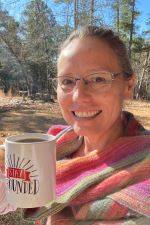 Georgina Woodward (GCSICA, GCSIP)
Georgina Woodward (GCSICA, GCSIP)
 Patricia Jill Burt (GCSIP)
Patricia Jill Burt (GCSIP)
Jill Burt serves as a Corporate Chaplain where, for the past seven years, she has provided spiritual and emotional support for resident seniors, staff and families of Christenson Communities. In addition to this area of service, Jill also works in the health care industry as a casual Spiritual Health Practitioner. Jill’s down time is spent in the outdoors, or enjoying good coffee, and meaningful conversations with friends and family.
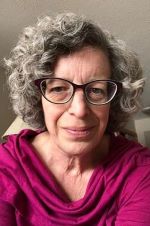 Civia Lee-Verstraete (GCSIP)
Civia Lee-Verstraete (GCSIP)
Civia lives as a Professional Healing and Vitality Coach (mostly remote and online) living in Canmore, AB. Learning to hold space for spiritual aspects was her intent in obtaining her certificate.
Favourite SSC Memory: Finding the online forum and connecting with other students online!
Future Ambitions: Continuing to further expertise in coaching and expanding range to help young people as well in the areas of healing, vitality and spirituality.
 Özlem Mavis (GCSIP)
Özlem Mavis (GCSIP)
Özlem Mavis is a community support worker based in Victoria, BC. She specializes in working with young adults who have diverse abilities. She is currently preparing for her upcoming graduate studies in Expressive Arts Therapy.
Bachelor of Theological Studies in Diaconal Ministry
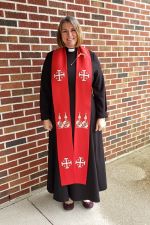 Christina Crawford
Christina Crawford
Reverend Christina Crawford is a member of the Diaconate of the United Church of Canada. She is a Spiritual Director through the Ontario Jubilee program for Spiritual Direction. Prior to Ministry, Christina worked in the field of domestic violence, assisting individuals and families with the emotional and practical life changes that occur in times of crisis and transition. Christina is passionate about helping people nurture their relationships with God, spiritual formation, and community & family ministries. Christina enjoys sharing her insights and knowledge through writing, teaching, and facilitating meditation, spiritual development, yoga, and natural healing classes and retreats.
Favourite SSC Memory: The Women in the Hebrew’s Scripture’s held at St. Stephen’s May 2019 – deep learning, knowledgeable teacher, and wonderful classmates.
Future Ambitions: Christina currently serves in congregational ministry at St. Paul’s United Church in Milton Ontario.